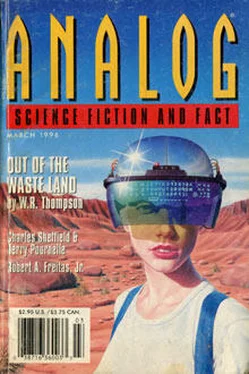W. Thompson - Out of the Waste Land
Здесь есть возможность читать онлайн «W. Thompson - Out of the Waste Land» весь текст электронной книги совершенно бесплатно (целиком полную версию без сокращений). В некоторых случаях можно слушать аудио, скачать через торрент в формате fb2 и присутствует краткое содержание. Год выпуска: 1996, Издательство: Dell Magazines, Жанр: Фантастика и фэнтези, на английском языке. Описание произведения, (предисловие) а так же отзывы посетителей доступны на портале библиотеки ЛибКат.
- Название:Out of the Waste Land
- Автор:
- Издательство:Dell Magazines
- Жанр:
- Год:1996
- ISBN:нет данных
- Рейтинг книги:5 / 5. Голосов: 1
-
Избранное:Добавить в избранное
- Отзывы:
-
Ваша оценка:
- 100
- 1
- 2
- 3
- 4
- 5
Out of the Waste Land: краткое содержание, описание и аннотация
Предлагаем к чтению аннотацию, описание, краткое содержание или предисловие (зависит от того, что написал сам автор книги «Out of the Waste Land»). Если вы не нашли необходимую информацию о книге — напишите в комментариях, мы постараемся отыскать её.
Out of the Waste Land — читать онлайн бесплатно полную книгу (весь текст) целиком
Ниже представлен текст книги, разбитый по страницам. Система сохранения места последней прочитанной страницы, позволяет с удобством читать онлайн бесплатно книгу «Out of the Waste Land», без необходимости каждый раз заново искать на чём Вы остановились. Поставьте закладку, и сможете в любой момент перейти на страницу, на которой закончили чтение.
Интервал:
Закладка:
Out of the Waste Land
by W. R. Thompson

Illustration by Mark Salwowski
The desert Sun was so bright that it almost blinded Margaret as she stepped out of the van. She blinked furiously for a moment and wished she could wear sunglasses again. Then she remembered her options. A sensor built into her silvery helmet’s rim measured her eye movements and fed the data into her computer, allowing her to click on the optical icon and drag the cursor across the Sun symbol. The eyeplate adjusted itself and began to reflect away some of the Mojave sunlight.
Once her eyes had recovered from the glare, Margaret clicked on her movement icons and looked around. Her head turned with none of the jerkiness she had known during her first weeks of therapy, and she got a clear, steady look at her surroundings. The van had stopped at a gas station in a small desert town—a few cinderblock houses with chicken coops and dish antennas in their sunbaked yards, a diner, and a convenience store. She had seen more impressive ghost towns. Dead, weed-choked ground stretched away from the town in all directions, while barren, eroded hills rose up a few miles to the east and north. The brown and tan colors of the land looked baked and dry.
The van’s driver seemed to read her mind; she realized he must have made this trip dozens of times. “It’s just a jumping-off point,” he told Margaret. He pointed to the badlands north of the town. “The big city is out that way.”
Margaret keyed in her speech icons. A symbolic keyboard appeared in the heads-up display of her eyeplate. Deftly, she looked at the translucent letters and icons, building up her answer one letter at a time: H, O, W, speak, F, A, R, speak. Her helmet’s computer relayed the commands to what was left of her neural system, and her lungs, larynx, and mouth worked. “How far,” she asked. Her voice was flat; intonations were too complex for the computer to handle.
“Fifty, sixty miles,” the driver said. “It depends on what path Ringo likes.”
The station attendant came out of the service bay. He was a teenage boy in a greasy Texaco shirt. He didn’t look at Margaret, which annoyed her. He must have seen this van and its driver often enough to know that the passengers were rehab patients from the UCLA Medical Center. That made her something less than a woman in his eyes. “Fill it?” he asked the driver.
“Yeah, and check the oil,” the driver said. He looked around impatiently as the boy uncapped the gas tank. “Where’s Ringo?”
“It’s Geisler to you, scumbag,” a man’s loud voice said. He walked out of the service bay and Margaret looked him over: big without being fat, scruffy beard and long graying hair tied in a ponytail, blue jeans and a black Harley Davidson shirt. He wore several silver rings on each finger, and Margaret saw his fingers wiggle with each step he took. A paraplegic, she guessed, still using the old-style limb stimulators instead of implants. “Anyone calling me ‘Ringo’ better have a widow named Yoko.”
The driver ignored his complaint. “Are you ready to go?” he asked.
“ ‘Ready,’ hell,” Geisler said. He patted his waist, and Margaret saw the bulge of a battery belt. “Eveready, man.”
“Well, good,” the driver said, “ ’cause I have to be back in Westwood before—”
“Tough,” Geisler told him. He turned to Margaret and stuck out his hand. “Tom Geisler. I’ll be your guide.”
Margaret clicked on her dexterity icons and placed the palm of her hand against his, then switched back to her speech icons. “Margaret Danes,” she said as they shook hands.
“Good to meet ya, Maggie,” Geisler said. “You ready?”
Now there’s a loaded question, she thought; she still wasn’t sure what to expect from what the therapists had told her would be a “wilderness survival experience.” Hiking through the California desert in the middle of June hadn’t struck her as a good idea, but she hadn’t wanted to argue with her therapists; she had been wrong about too many things to trust her judgment anymore, a thought she quickly dismissed. “My pack is in the van,” she said.
“Let’s see what you got before we saddle up.” Geisler went to the van’s rear hatch and opened it. Margaret followed him and saw him scowl at her orange backpack. “Jesus,” he grumbled as he opened it and started pulling out survival supplies. He tossed most of them aside: Halazone tablets, a large first-aid kit, a tube tent, instruction manuals, and other odds and ends she couldn’t identify. “Hey, weenie!” he shouted at the driver.
“Don’t you people ever learn?”
The driver joined them. “What’s your problem, Geisler?”
“It ain’t my problem,” he said, “it’s yours. You idiots loaded her up like a pack mule. When was the last time you brought me somebody who could carry sixty pounds of crap?” Geisler turned to Margaret and looked her over. “Nothin’ personal, but there’s no way you can carry all that junk.”
“I know,” she said. Exercise—endless hours on treadmills and machines, her body working in response to preprogrammed instructions from her helmet—had restored some of the muscle and endurance she’d lost during her illness, but she knew she still looked frail. “What do I need?”
“Not much,” Geisler said, as the driver wandered off. He finished emptying the pack, then retrieved a few items. He spoke as he crammed them into the pack. “Your sleeping bag. Suntan lotion. Toothbrush. Toilet paper. Salt tablets. What’s this?” he added, picking up something that looked like a roll of blue metal foil. A wire dangled from one end of the roll.
“Solar battery recharger,” Margaret said. “I need it. And the cleaning fluid. For my eyeplate.”
“OK.” Geisler zipped up the pack and handed it to Margaret. Quickly, she clicked on her dexterity icons and maneuvered her hands to take the pack. Her fingers wrapped around a shoulder strap, and she threaded her free arm through its loop. Last night she had spent a half-hour practicing the maneuver of putting on her backpack. The practice helped, and she was able to get the load in place and snugged down with little difficulty. Her neural prosthetics told her that the pack was much lighter than it had been last night, and when she took a few experimental steps she found it easier to move. Her body seemed to shift around less, too; with the lighter load on her back, the helmet’s sensors had less trouble maintaining her balance as it automatically worked certain leg muscles to keep her upright.
The attendant had washed the van’s windows, and as Margaret turned around she saw herself reflected in a window. The helmet covered her head, protecting the computer and the thousands of hair-fine electrodes implanted throughout her brain, and holding the display’s glass plate in front of her eyes. The smooth metal dome only emphasized the hollowness of her cheeks, reminding her of what she’d gone through. Illness, surgery, therapy, Lydia’s death—
She couldn’t think about that. She forgot about it. Geisler had walked away, going behind the gas station. Margaret went after him, and found him standing next to an old black motorcycle. He stood with his legs apart to keep himself braced as he dug into its saddle bags. He slung a bedroll and a rucksack over his shoulders, then buckled a web belt with a pair of canteens and a small first-aid kit around his waist. “You ready to roll, Maggie?” he asked.
“Yes.”
“Guess again.” He pulled another pair of canteens from his saddlebags and handed them to her. “Last thing you want to do is walk into the desert without water,” he said, as she fumbled with the belt that held the canteens. “You can get dehydrated in no time. Sunstroke, too. Where’s your hat?”
Читать дальшеИнтервал:
Закладка:
Похожие книги на «Out of the Waste Land»
Представляем Вашему вниманию похожие книги на «Out of the Waste Land» списком для выбора. Мы отобрали схожую по названию и смыслу литературу в надежде предоставить читателям больше вариантов отыскать новые, интересные, ещё непрочитанные произведения.
Обсуждение, отзывы о книге «Out of the Waste Land» и просто собственные мнения читателей. Оставьте ваши комментарии, напишите, что Вы думаете о произведении, его смысле или главных героях. Укажите что конкретно понравилось, а что нет, и почему Вы так считаете.












